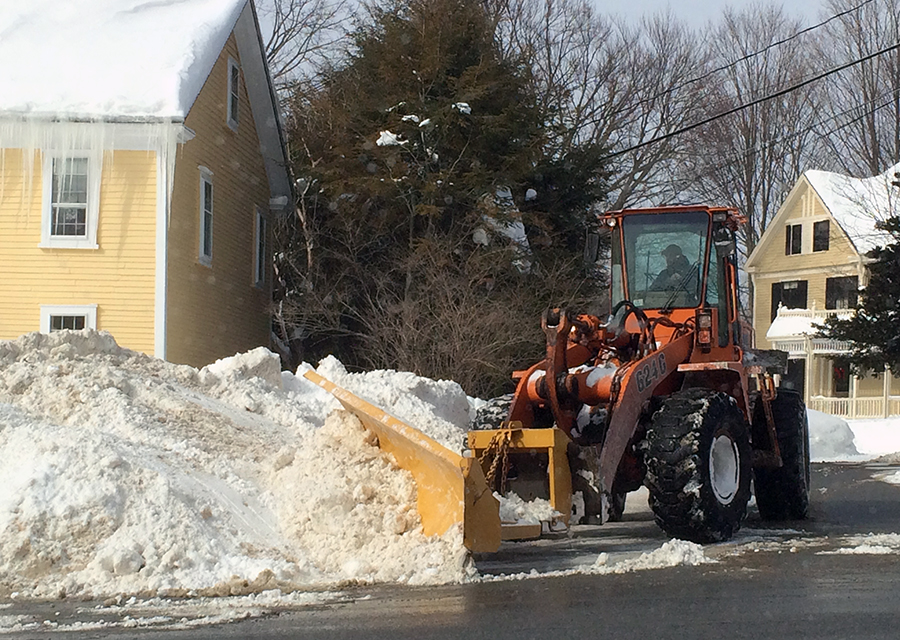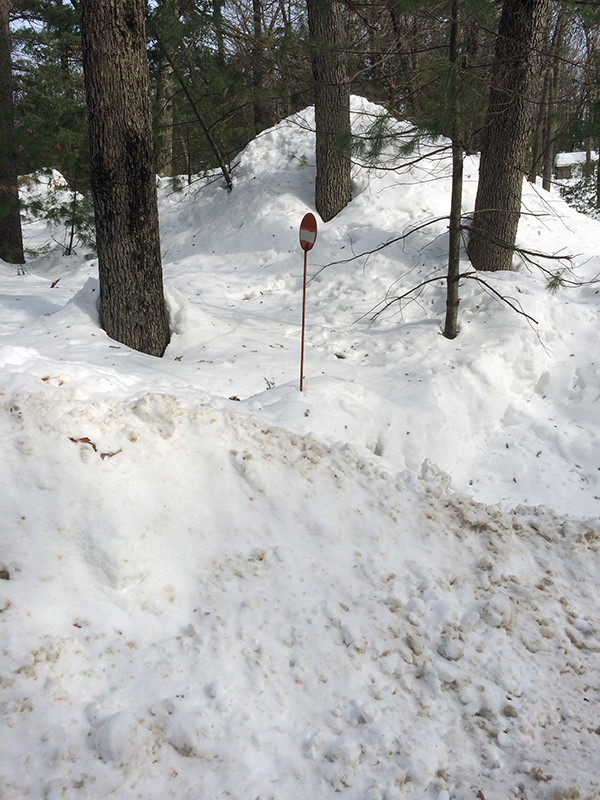By Alice Waugh
Lincoln has thus far escaped any major problems from the record-breaking snow and cold over the past few weeks, but the danger of roof collapses will only grow with another storm this weekend—and this one may include ice and rain as well as snow.
Police and fire officials reported that as of Thursday, there had been no power outages or medical emergencies directly caused by the weather. “We’ve been very fortunate,” said Police Chief Kevin Kennedy. “The DPW [Department of Public Works] needs to be commended for the job they’ve done maintaining the roadways.”
The Fire Department has had to alter its usual response to calls as a result of the accumulated snow, said Fire Chief Stephen Carter, who is also the town’s emergency management coordinator. In normal circumstances the department sends an engine and a ladder truck, but the ladder truck won’t fit down most driveways these days, so the department sends a second engine that carries extra water instead. Every piece of fire apparatus also now carries at least one snow shovel, since firefighters often have to clear snow away from homes just to get access to residents who need help, he said.

A worker uses heavy equipment to push back snowbanks from the corner of Sandy Pond and Lincoln Roads. Photo by Alice Waugh
Shortly before the January blizzard, Town Administrator Tim Higgins reported to the Finance Committee that “we had spent very little” from the town’s $265,000 snow removal budget. However, as of Thursday, the town had gone through $300,000, and some contractors’ bills from the last storm were still expected. “To see the budget swing so sharply in a four-week period was really pretty amazing,” Higgins said.
The DPW staff who man the snowplows “are pretty much exhausted… they’ve been essentially going around the clock for four weeks,” Higgins said. “I’ve been really pleased and impressed with the quality of their work and their dedication.”
Owners of commercial property with flat roofs have been “very proactive” in clearing snow, Carter said. Workers have been clearing roof drains above the Mall at Lincoln Station, and a crane has removed hundreds of tons of snow from portions of the building’s roof in recent days, said Bill Jackson, president of Jackson Associates, which manages the mall for the owner, the Rural Land Foundation.
Four years ago, the roof over a recently remodeled Donelan’s Supermarket collapsed from heavy snow. The entire mall was closed briefly for inspection and Donelan’s did not reopen until May 2012. After the collapse, roofing was reinforced over the entire mall where necessary and the Donelan’s roof was rebuilt to hold 55 pounds of snow and ice per square foot, well above the current code requirement of 35 pounds per square foot, Jackson said, “so we’re pretty confident.”
School being proactive in roof clearing
The Lincoln School has been clearing some roof areas during this week’s school vacation and the school’s facilities staff has been assessing the roofs in recent weeks. “They do not feel that our roofs are stressed, or in danger in any way,” Superintendent of Schools Becky McFall said in an email to the Lincoln Squirrel last week. “This proposed partial removal is proactive, not reactive. We do not feel that the current snow load presents a roof collapse problem in any way.”
Though there are leaks evident in several parts of the school, McFall told the School Committee on February 12 that those leaks are not due to structural problems but are simply indicators of where the roof membrane has been compromised due to age. “Regardless of how much snow is on the roof, when there is snow and it melts, it’s going to leak in those places, so we’ve got buckets all over,” she said.
The schools have already used up their allotment of five snow days, so the School Committee sent an online poll to all parents asking for their input on how any further snow days should be made up. McFall recommended to the committee that if more makeup days are needed, classes should be held on April 3 (Good Friday), June 25 and then part of April vacation, in that order. The last day of school is currently scheduled for Wednesday, June 24.
Fire hydrants often buried
Water Department staff have been working to clear snow away from fire hydrants, and officials have urged residents to “adopt a hydrant” near their home and keep a three-foot radius around each hydrant clear of snow and ice. Water Department Superintendent Greg Woods’ staff has been out with plows and shovels but has had a hard time keeping up with the snow that blocks hydrants anew whenever the roads are plowed.
“It’s very frustrating to have cleared the hydrants in a section of town only to have that open area immediately filled with snow during the next storm,” Woods said. “The significant snow accumulation is making it difficult to clear the hydrants, but every hydrant that’s cleared by a resident gives the department that much more time to focus on the more difficult locations.”
There have been several instances when recently cleared hydrants have been intentionally filled or buried because a contractor saw an open space to push snow. “We understand it’s difficult to keep driveways and sidewalks open with this volume of snow, but there’s no excuse for intentionally covering a fire hydrant. It puts the public at risk,” Woods said, adding that intentionally burying fire hydrants is prohibited by state law and is punishable by a fine of up to $100.
More danger to roofs this weekend
Although there’s been a lot of snow since late January, the snow has been light and fluffy, so it hasn’t stuck to tree branches and power lines. However, this weekend’s storm is expected to feature rain in addition to heavy wet snow, which will only add to the weight already borne by roofs.
“That’s not going to be good,” Carter said. Even without any more new snowfall, the snow that’s already on roofs will settle, and eventual melting and refreezing will only worsen the situation. “I’m dreading that,” he said with a sigh.
At the behest of state and federal governments, Lincoln and other towns have improved their planning for weather emergencies. Local emergency personnel have been checking in with at-risk seniors, worked with The Commons on planning for sheltering residents if it becomes necessary, beefed up mutual aid with surrounding towns for emergency responses, and used reverse 911 calls to alert residents of road closings and potential weather dangers, including potential roof collapses. The Massachusetts Emergency Management Authority also offers tips on roof snow removal and how to recognize signs of a structural problem.
Meanwhile, residents are scrambling to find someone—anyone—with expertise in clearing snow and ice dams and repairing roofs and gutters that have already been damaged. “These guys are going to be busy until May,” Carter said.

